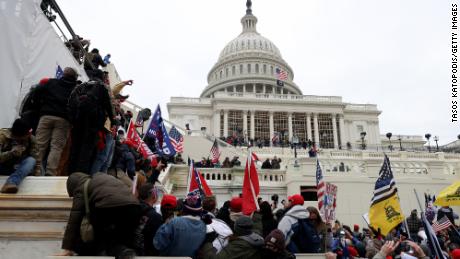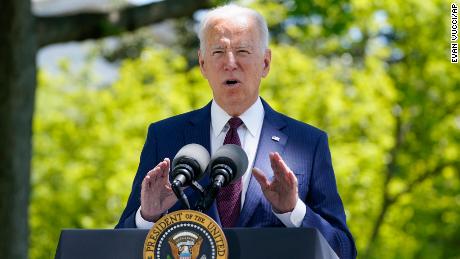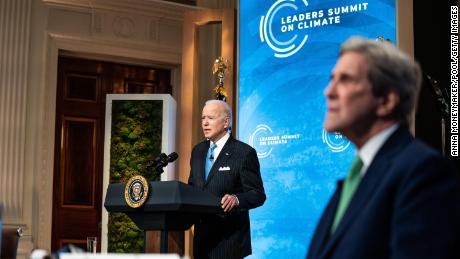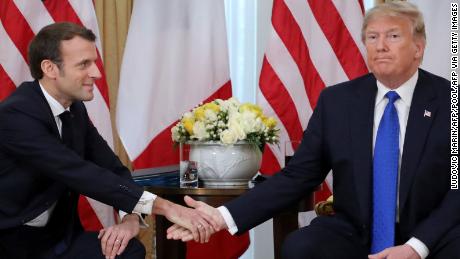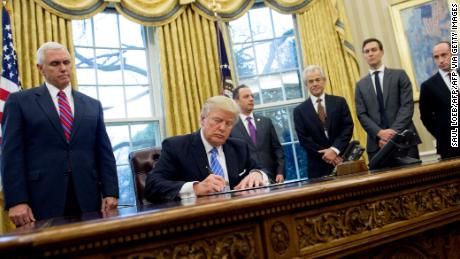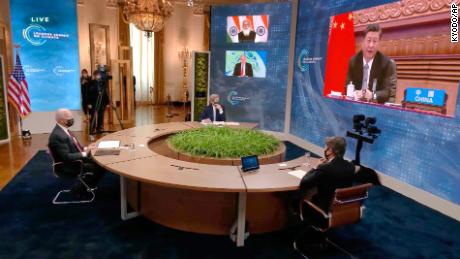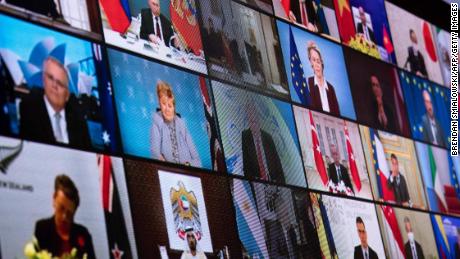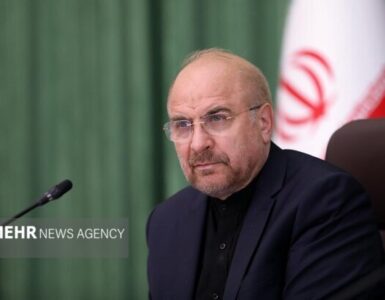But the specter of Trump is already haunting Biden’s mission to reengage with the world and lead it once again. Traditional US allies who spent the past four years unable to establish stable relations with the White House are now wondering if they can take Biden at his word. They’re well aware that Trumpism is still alive, and they wonder if, four years from now, a divided America may reelect him, or another America First president.
Where Trump used dozens of executive actions to steer his country in an entirely new direction, Biden has used even more — on track for a record number — in his first 100 days to bring it back. With the stroke of a pen, he halted the process of the US pulling out of the World Health Organization, rejoined the Paris climate change agreement, scrapped the so-called Muslim travel ban and defunded the construction of a border wall with Mexico.
On Thursday last week, Biden sought to reassure the world the US was ready to resume its global leadership by hosting a climate change summit and committing his country to an ambitious 52% reduction in carbon emissions by 2030, from 2005 levels. The US successfully rallied the leaders of 40 countries to participate, including Chinese President Xi Jinping, Russian President Vladimir Putin and Brazil’s climate skeptic leader Jair Bolsonaro.
But behind this grand show of global unity, government officials worry a different US president in the near future could pull out of the Paris Agreement again.
“We’re really on a critical path. In other words, any new derailment of the Paris agreement and of the implementation of the commitments puts us against a wall, especially with today’s climate consequences that will keep increasing in the coming years,” an official source from France’s Elysee Palace told CNN.
“And so unfortunately, there is no Plan B if one of the major emitters decides to disengage and not to play its part in the fight against climate change, whether it be the United States, whether it be China or any of the top emitters.”
But other countries and organizations affected by the US’ constant and sudden changes in foreign policy are now looking to rethink legislation and agreements to ensure progress in collaborative areas — like development, counterterrorism and trade — is not vulnerable to the whims of America’s convulsive politics.
A senior EU official working on foreign affairs and another European diplomat, who both spoke to CNN on condition of anonymity, said they were specifically concerned about Trump or former Secretary of State Mike Pompeo running and winning the presidency in 2024, fearing such an outcome could see a US return to isolationism.
Rather than rebuilding the relationship that existed pre-Trump, they said, the EU’s priority was to now build something more resistant to executive orders. The focus is on convincing US institutions that it’s in their interest to be engaged with the wider world and promote Western democratic ideas.
An example the European diplomat raised with an American counterpart was greater engagement in tackling poverty in parts of Northern Africa where terror groups are active. The argument they made was that enriching the lives of citizens makes joining terror groups there less attractive. That not only makes the world — including the US — safer, but it also gives the US some moral high ground, the diplomat said.
“We need to make it received wisdom in American diplomacy that walking away and going it alone in numerous areas will have practical and moral implications,” the diplomat said.
But in general, the feeling in Brussels is positive. Officials there are delighted that Biden and Secretary of State Antony Blinken are answering their calls.
“We felt the change in atmosphere from day one. Trying to get Pompeo to attend EU foreign minister meetings or Trump’s inner circle to coordinate on policy areas was very painful. But since the Biden administration has been in place, there have been discussions between diplomats on an almost daily basis,” the EU official said.
In Biden’s first 100 days, Europe and the US have already coordinated on sanctions on Russia and Belarus, dialogue on climate issues, coordination at the UN and containing Russian aggression in the Balkans, the officials said. Even on one of the toughest issues — reviving the Iran nuclear deal that Trump abandoned — the EU is confident an agreement will eventually be reached.
The window for rebuilding a transatlantic alliance that cannot be so easily broken could be small.
Steven Blockmans, director of research at the Center for European Policy Studies, said the EU and US would want to have agreed future principles in areas like regulating modern technology and climate change before the G7 summit in June, where they would ideally like to show a united front. The US midterm elections in 2022 will also be a key deadline.
“Biden will presumably want some major foreign policy wins going into those elections, so we should know by then how far the US is willing to go in terms of cooperation. And if he takes a beating in those elections, you can expect he will take a greater interest in domestic policy over international affairs,” Blockmans said.
It’s not just officials who are feeling anxious about the US’ “flip-flop” foreign policy. The International Planned Parenthood Federation (IPPF) — whose 118 member associations provide sexual and reproductive health services for women and girls around the world — is calling on Congress to pass a bill that will repeal the Mexico City Policy permanently.
The policy, known by critics as the Global Gag Rule (GGR), was introduced in 1984 by Republican President Ronald Reagan and denies organizations of US funding to provide abortion services, including counseling. Every Democratic president since has rescinded the rule with an executive order, and every Republican president has reinstated it.
In Trump’s case, he expanded the policy to ban funding going to any health activity linked to an organization offering abortion advice or services. For IPPF, that meant that it lost its funding for programs in HIV, reproductive cancers and maternal health, among others.
“We try to be prepared so we’re not as affected by the constant yo-yoing of these policies changing in the US. Nonetheless, when the GGR came back in under Trump, we were not expecting it would be expanded to all our global health programming, so that really caught us off guard,” said Riva Eskinazi, Director of Strategic Partnerships & Development at IPPF.
“We find these sudden shocks very dangerous to women’s health and it shouldn’t be for these people, with a stroke of a pen, to make decisions that have such devastating implications,” she said.
“Every time, it’s the trust of the woman or the girl who comes to the clinic that you lose because they all of a sudden can no longer find the kind of services they were expecting to find.”
Biden has to walk a fine line of appearing to shirk the America First ideology to the rest of the world, while, at home, making Americans feel like he is indeed prioritizing them.
After vowing, in his powerful foreign policy speech, to lift the cap on refugee admissions from Trump’s low 15,000 to 125,000 in the next fiscal year, for example, the President walked back his promise, saying he would stick to the 15,000 limit after all. Sources told CNN he resisted raising it because of political optics, as the administration faces questions for its handling of an influx of migrants at the US-Mexico border.
He later agreed to raise it after furor from refugee activists, but the final number is still unlikely to land anywhere near the number he boasted in his February speech.
And it was only as India reached a devastating stage of the pandemic — now recording more than 300,000 new Covid-19 cases a day — did the Biden administration finally agree to share up to 60 million AstraZeneca vaccines with the rest of the world.
Until that announcement on Monday, the Biden administration had almost entirely ignored calls to share vaccines, sending only a limited number of AstraZeneca shots to Mexico and Canada, as the US presses ahead with one of the world’s biggest and fastest inoculation programs.
The AstraZeneca vaccine has not yet been approved in the US and has been limited in use in many developed countries — even scrapped entirely by some — after medicines regulators found a possible link between the shot and a rare blood clotting condition.
As millions of vaccinated Americans regain freedoms, more than 90 of the world’s poorest countries will be waiting until 2023 to have 60% of their populations vaccinated, according to a Duke University study. The study also projected that the United States may have 300 million excess doses by the end of July.
But the biggest challenge Biden will face in striking this balance between America First and returning to the world stage will be reinventing the country’s China strategy. Under four years of Trump, the US had an on-again-off-again relationship with China. It ended mostly “off,” and in confrontational competitiveness, with little collaboration.
Biden’s posturing against China may not be as bombastic as Trump’s, but it doesn’t appear to be very different either. In an interview with the New York Times last year, he couldn’t help but accidentally utter “America First” in his own remarks on China. It’s a difficult phrase to avoid. “I want to make sure we’re going to fight like hell by investing in America first,” he said.
Biden has a real China problem. He is intent on reinvigorating the cause of democracy around the world — like his climate summit, he will hold another on democracy in May to galvanize the same kind of global momentum. He is rallying US allies to show a united front against China, on issues such as Beijing’s abuse of Uyghurs and other minorities in Xinjiang, and its draconian use of its National Security Law to clamp down on civil liberties in Hong Kong. Yet he will be forced to work with China, as seen last week at the climate summit.
“The hope was China would become a big Germany in Asia. But what we’ve seen, under President Xi especially, is that hasn’t happened,” said the Atlantic Council’s Matt Kroenig, who held defense and intelligence positions with the Bush, Obama and Trump administrations. “Instead China has gone in the wrong direction on almost every measure — backtracking on economic reforms, cracking down on human rights and becoming assertive, asserting its military, in its territorial claims in Asia.”
In a recent paper, Kroenig outlined a framework for a three-pronged global China strategy arguing that engaging with China is essential, but could be done while defending other nations’ interests and improving their strengths and competitiveness at home.
Biden will have to carefully consider when and how much to cooperate with China, as two-thirds of Americans have a negative view of the country, polling by the Pew Center for Research shows — the worst level since the agency began taking the temperature on China in 2005.
As the US faces distrust from allies, the Trump years have emboldened its rivals, including China. Chinese Foreign Ministry spokesman Zhao Lijian mocked the US for choosing “to come and go as it likes” on the Paris Agreement, and challenged the country on whether it would make up for the lost US funds that were supposed to go to a climate fund for developing nations during the Trump years.
“Its return is by no means a glorious comeback but rather the student playing truant getting back to class,” Zhou told reporters ahead of the climate summit.
The unstable Trump years have also given fuel to Beijing to argue its system of governance is superior. Beyond economic competitiveness, there’s a soft power battle going on too.
“Biden now faces a China that not only has real economic and political clout on the world stage, but also one that is competing with the US to win the hearts and minds of global citizens,” said Diana Fu, a non-resident fellow at the Brookings Institute’s John L. Thornton China Center.
“Biden now faces a Beijing that is bent on being a rules-setter rather than a rules-follower and sees the US as the number one obstacle to realizing this goal.”
But what could be an even bigger worry for Biden is whether his defense decisions now will prove right years down the track.
Robert Gates — who served as defense secretary under George W. Bush and for two years for the Obama administration — claimed in a book he authored that Biden had been “wrong on nearly every major foreign policy and national security issue over the past four decades.” It might have been a harsh assessment, but it’s true that Biden has backed many a failed defense policy, and rejected others that proved more successful.
He voted in favor of the Iraq war in 2003, for example, but against the Gulf War in 1991, in which the US and its allies liberated Kuwait in just five weeks. He advised President Barack Obama against the raid by US SEALS that killed Osama bin Laden. Defense could be Biden’s Achilles heel.
Biden has pledged to end US involvement in Afghanistan — a centerpiece policy in Trump’s America First agenda — setting the symbolic date of September 11 as a deadline to leave. Equipment is already being shipped out of the country.
It’s a questionable decision, given the US only had around 2,500 military personnel (excluding those serving through NATO) when Biden took office in January, and the money the US spends on its mission there is no longer a major drain on the country’s budget. No American troops have been killed in combat in the country now for more than a year, Defense Department data shows. Hundreds were dying each year a decade ago, at the height of the war.
“With Afghanistan, let’s be honest, it’s as much about making the right decision as taking the least-worst option — and all options are bad,” said Nick Reynolds, a land warfare analyst at the London-based Royal United Services Institute.
“But staying is a better option than withdrawing because there’s a strong risk that following withdrawal, the Taliban will win. That is a strong possibility.”
Memories of Taliban rule in the 1990s — and even current rule in parts of the country today — offer a grim glimpse of what could become of the whole nation should its government fall. There are serious concerns about women and girls, who had won back some rights since the US invasion but are likely to lose them in any Taliban-controlled state.
“In the 1990s, the Taliban were disinterested in human rights and development, it was an extremely conservative theocracy, and if the US hadn’t invaded, Afghanistan would have been in a famine by 2002, because of economic and agricultural mismanagement. They had a long track record of massacring their opponents. We could easily see a repeat of that kind of behavior,” Reynolds said.
A hundred days into a presidency is usually a time for optimism, as it’s typically too early to fail. But as the Iraqi invasion eventually defined George W. Bush’s legacy, the state of Afghanistan four years from now could define Biden’s. He’ll want to make sure his decisions now strike the right balance between America First and America Is Back.

